#Diploma in Dietetics
Explore tagged Tumblr posts
Text
Diploma Course In Nutrition and Dietetics | NIIB Institute

Are you passionate about health and wellness? Do you dream of helping others achieve their fitness and dietary goals? A Diploma in Nutrition and Dietetics can be your gateway to a rewarding career in the health and nutrition sector.
Why Choose a Diploma in Nutrition and Dietetics?
In-Demand Career Path: With increasing awareness about healthy living, the demand for qualified nutritionists and dietitians is on the rise.
Diverse Opportunities: Graduates can work in hospitals, fitness centers, schools, corporate wellness programs, or even start their own consulting business.
Positive Impact: Help people improve their quality of life through better dietary habits and nutrition education.
How to Get Started?
Getting started is simple! Look for accredited institutions offering a Diploma in Nutrition and Dietetics. Ensure the program aligns with your career goals and provides hands-on training.
Conclusion
A Diploma in Nutrition and Dietetics is more than just a qualification; it’s an opportunity to make a difference in people's lives. By understanding the science of food and its impact on health, you can play a crucial role in shaping healthier communities. Start your journey today and become a certified expert in nutrition and dietetics.
Whether you aim to work in a clinical setting or launch your own wellness brand, this diploma can pave the way for a fulfilling career.
#Diploma in Nutrition and Dietetics#Nutrition and Dietetics#Diploma Course In Nutrition#newimageinstitue#beautyacademy#niib
0 notes
Text
#Diploma in Nutrition & Dietetics Course#Diploma in Nutrition & Dietetics#Nutrition & Dietetics Course
0 notes
Text
Exploring the Postgraduate Nutrition and Dietetics Diploma.

The article highlights the postgraduate diploma in nutrition and dietetics ignou as a valuable opportunity for those dedicated to improving community health and well-being, offering skills in dietetics and public health nutrition.
Postgraduate Diploma in Nutrition and Dietetics IGNOU
IGNOU, an Indian university, offers online education programs, including the PG diploma in nutrition and dietetics. Established in 1985, the program provides students with a comprehensive understanding of the field, focusing on cutting-edge research, evidence-based techniques, and emerging trends in the field.
Course Structure and Curriculum
The postgraduate diploma in nutrition and dietetics ignou aims to make you an authority in your field, focusing on theory and practice. It covers topics like nutrition in health, nutritional therapy, and disease prevention. The program covers research techniques, nutrition analysis, community nutrition, and food labeling guidelines. Fees range from Rs 20,000 to Rs 30,000 for a one-year program.
The PG diploma in dietetics and public health nutrition ignou is open to diverse candidates, preparing healthcare professionals and aspiring nutritionists for a fulfilling career and a positive impact.
Career Opportunities
PG Diploma in Nutrition and Dietetics graduates have diverse job opportunities in public health, healthcare, and food industry. They learn to become nutritionists and dietitians, emphasizing the importance of nutraceuticals and health supplements in diets.
Top 5 Nutrition Academy of India
The PG diploma in dietetics and public health nutrition can help individuals determine eligibility for various academies, with a list of significant Nutrition Academy options provided.
1. Meribindiya International Academy2. VLCC Institute3. Orane Institute4. NFNA (National Academy of Fitness and Nutrition)5. National Institute of Nutrition, Hyderabad
Conclusion
The postgraduate diploma in nutrition and dietetics offered by IGNOU presents a significant opportunity for individuals seeking to enhance community health through specialized knowledge and skills in dietetics and public health nutrition, ultimately leading to diverse career prospects in the field. This program equips graduates with essential competencies to make a positive impact in various sectors, including healthcare and the food industry.
#diplomainnutritionanddietetics#ignou pg diploma in dietetics#diploma in nutrition and dietetics ignou#ignourcourse
1 note
·
View note
Text
Unlock a Career in Health and Wellness with NIIB Institute’s Diploma Course in Nutrition and Dietetics
If you are passionate about health, wellness, and helping others lead healthier lives, NIIB Institute’s Diploma Course in Nutrition and Dietetics is your gateway to a rewarding career. This comprehensive program offers a deep dive into the world of nutrition science and dietary practices, equipping you with the knowledge and skills needed to succeed in this growing field.
Why Choose Nutrition and Dietetics?
In today’s health-conscious world, the importance of proper nutrition cannot be overstated. With a rising awareness of how diet impacts overall health and well-being, the demand for qualified nutrition and dietetics professionals is on the rise. Whether you aspire to work in healthcare, fitness, community health, or even food production, a strong foundation in nutrition and dietetics opens doors to numerous career opportunities.
Course Overview
NIIB Institute’s Diploma in Nutrition and Dietetics is meticulously designed to provide a holistic education in this vital field. The curriculum covers a wide array of topics that are essential for anyone looking to build a successful career in nutrition. The course is tailored to meet the needs of the industry, ensuring that graduates are well-prepared to face the challenges of the profession.
Conclusion
Choosing NIIB Institute’s Diploma in Nutrition and Dietetics is a step towards a fulfilling and impactful career. With a robust curriculum, expert guidance, and a commitment to student success, this course will equip you with the tools needed to excel in the field of nutrition and dietetics. Whether you are looking to start a new career or enhance your existing skills, this diploma offers the perfect platform to achieve your goals.
0 notes
Text

#dietician course in india#nutrition courses#postgraduate nutrition and dietetics programmes#pg diploma in nutrition and dietetics
0 notes
Text

SSODL Provide diploma in nutrition and dietetics course.This program is targeted for individuals seeking opportunities in the field of Nutrition and Dietetics
0 notes
Text
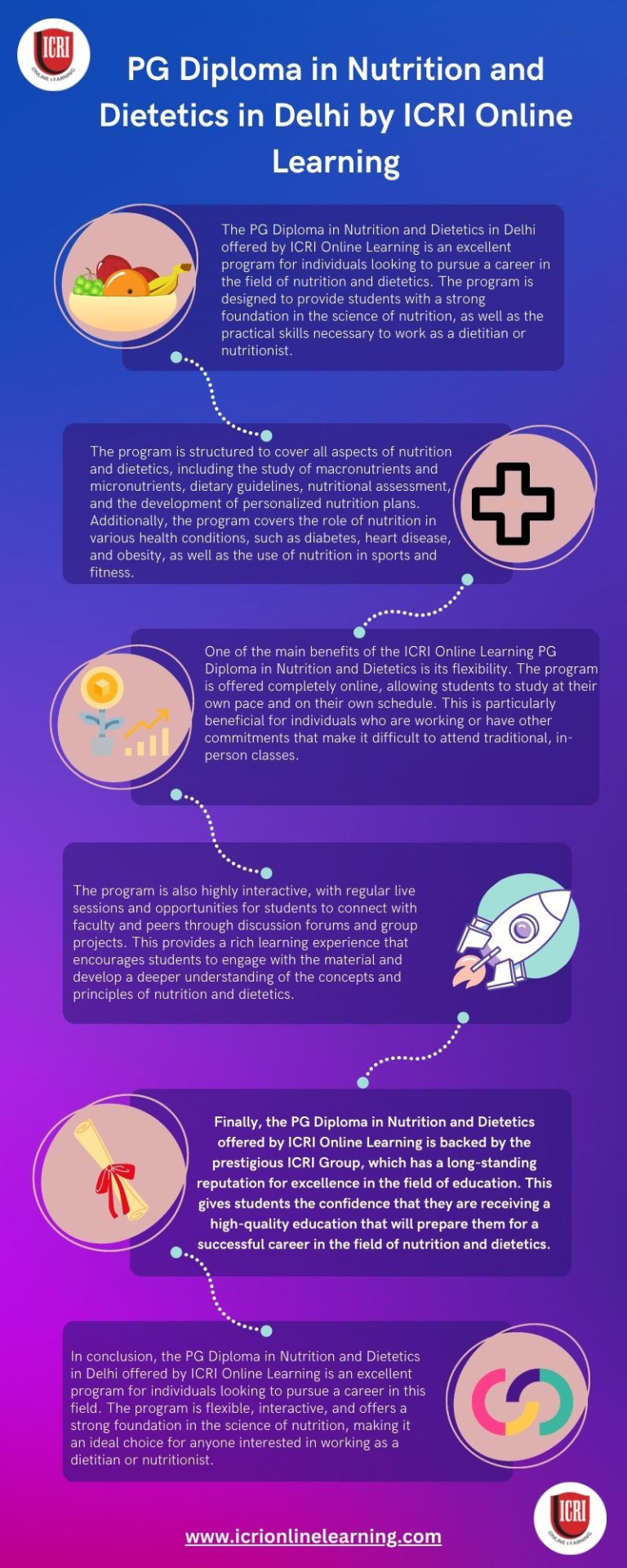
Online Certificate Course in Nutrition and Dietetics
Online Certificate Course in Nutrition and Dietetics presented through ICRI Online Learning is an brilliant program for students looking to pursue a profession within the area of vitamins and dietetics. The program is designed to offer college students with a strong foundation in the technology of vitamins, as well as the sensible skills necessary to work as a dietitian or nutritionist.
#Online Certificate Course in Nutrition and Dietetics#PG Diploma in Nutrition and Dietetics in Delhi#Diploma in Nutrition and Dietetics
0 notes
Text
0 notes
Photo

VLCC Institute for best Dietician Courses in India. We offer Dietician training courses in the Courses in Nutrition and Dietetics, Dietician and Nutrition Courses, Dietician Nutrition Courses, Diploma in Nutrition, Nutrition Institute, Nutritionist Course, Nutrition Courses in Delhi, Diet and Nutrition Course.
#Diabetes Educator Course#Nutrition and Dietetics#Dietician and Nutrition Courses#Nutrition Courses#Diploma in Nutrition#Nutrition Institute#Nutrition Courses in Delhi
0 notes
Text
Registered Dietitian Course
To find out where to enrol in the Registered Dietitian Course to become a licenced dietitian practitioner, go to The Institute Of Holistic Nutrition. Many people can be welcomed, counselled, and given the tools they need to improve their nutritional practises while taking into account their values, beliefs, surroundings, and accessible resources.

#registered dietitian programs ontario#dietitian program online#dietitian school ontario#diploma in nutrition and dietetics in canada
0 notes
Note
Hi! My employer's workplace wellness program was recently revamped, and I'm trying to assess whether it's slid into the nonsense side of wellness-world. Specifically, there's a webinar being offered by a guy named Abra Pappa on using an "anti-inflammatory diet" to "battle against chronic diseases… including heart disease, diabetes, arthritis, and even certain cancers." This sounds… sketchy to me, but I know you have both expertise in nutrition and a strong bullshit detector, so wanted to ask what you make of it.
Okay long story short never trust anyone who got their degree from a university that started off as a school for chiropractors.
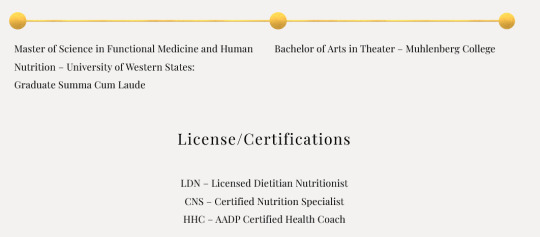
Abra Pappa got her MS in Functional Medicine and Human Nutrition after getting a BA in Theater; I checked the requirements for that degree and the school's whole catalogue is throwing red flags but what's throwing the most red flags for me is that if I wanted to get a degree in nutrition from an ACEND accredited program I'd need to take a hell of a lot more than one bio class, one anatomy OR one physiology class, one medical terminology class, one nutrition class, and one biochemistry class in order to get into a master's program.
It's funny because she went from a BA in theater arts to an MS in Functional Nutrition and Human Nutrition and I've been trying to go from a BA in Theater Arts to an MS in nutrition and *aside* from the whole private school costs thing one of the major barriers is that I'd basically need to re-do all of my undergrad to get in a lot of chemistry, some calculus, and MANY nutrition classes before I qualified for a Master's program. But based on the program she took I'm only one medical terminology and one biochemistry class away from a Master's program instead of more like ten to fifteen classes (primarily in nutrition, chemistry, and physiology) away.
Anyway she says she's a Licensed Dietician Nutritionist. There are some states that allow LDN certification, New York is one of those states. *BUT* to be an LDN in New York you have to
Complete a program in dietetics-nutrition that culminates in a bachelor’s degree that qualifies for certification in dietetics-nutrition or has been accredited by the Commission on Accreditation for Dietetics Education (CADE).[Note: CADE is now ACEND] The program must include at least 45 semester hours of coursework in dietetics/nutrition and must include at least 20 semester hours of coursework in the area of human biological sciences and social and behavioral sciences
Pappa went to the University of Western States in Oregon, and the only ACEND accredited school in Oregon is at OSU, so if she's an LDN it's from someplace that isn't New York, where she lives and works.
She also claims to be a CNS, a Certified Nutrition Specialist, but in order to qualify for THAT you need to have an MS with some pretty rigorous coursework
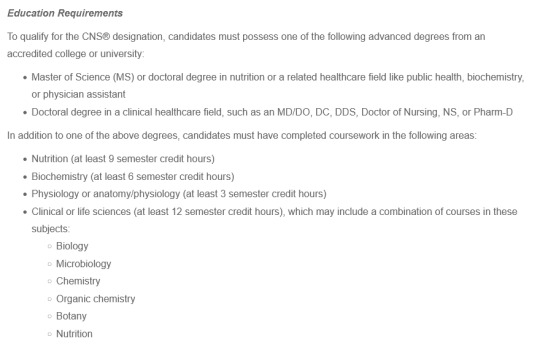
And this is what the school required for her MS program:
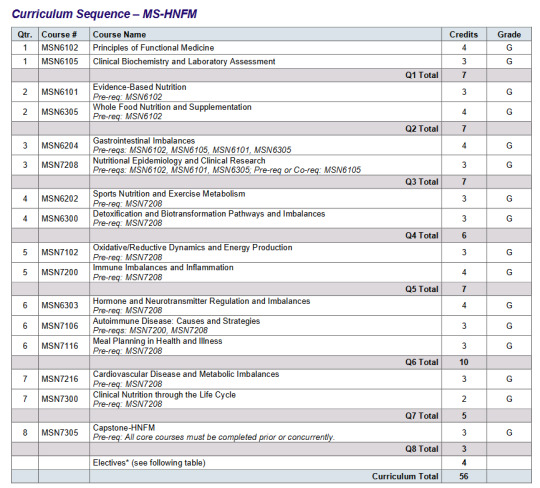
And given that she didn't have a science degree for undergrad it seems pretty likely that she wasn't doing anything close to what an undergrad nutrition program looks like:

For the record, here are the MS requirements for an MS in nutrition with a health and wellness emphasis at that same school:
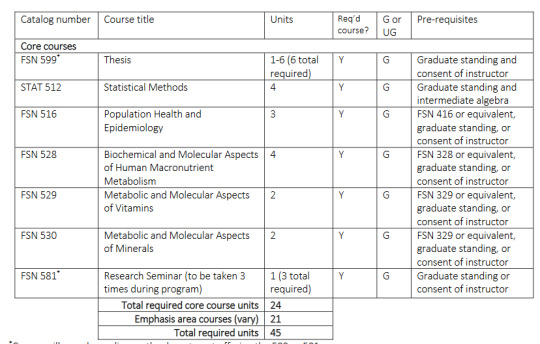
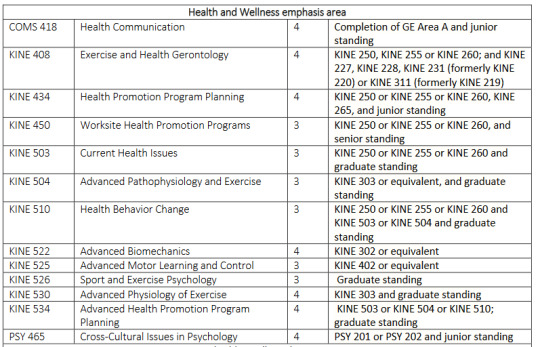
In order to get accepted to the MS in nutrition program in that school you either need to have a BS in nutrition or a BS in biology or chemistry and take all the undergrad level nutrition requirements ON TOP OF that BS.
I don't think that a theater degree and an MS from a woo-y correspondence school really count, even if you do pay $45k for your diploma.
If you go look at the requirements for any ACEND accredited school and compare them to the MS program from University of Western States it leaves UWS looking pretty shitty in comparison. Like, nowhere in her requirements is there a statistics class! Stats is required even for an associate transfer certificate in nutrition! EVEN AT THE 2-YEAR LEVEL FOR REAL NUTRITION DEGREES YOU HAVE TO DO STATS AND SHE DIDN'T HAVE TO TAKE A SINGLE STATS CLASS FOR HER MS. You will note that the cal poly MS program has one entire MS-Level class on vitamin metabolism and one entire MS-Level class on mineral metabolism for any of the three MS in Nutrition emphasis courses; her school required neither.
This shit makes me want to climb the walls.
I'm just going to start calling myself a nutritionist. California will let anyone call themselves a nutritionist, there are absolutely zero protections on that term and I can get myself a piece of paper for like three hundred dollars from a diploma mill that has some kind of bullshit accreditation.
Here are the programmatic accreditations her school has:
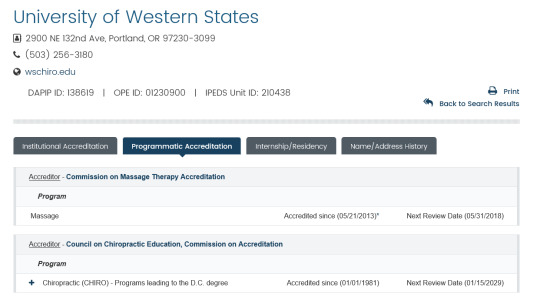
Compare with the Cal Poly programmatic accreditations (I cite cal poly a bunch because it was the program I was hoping to get into eventually so I researched it the most; that's where I got my BA, go broncos):
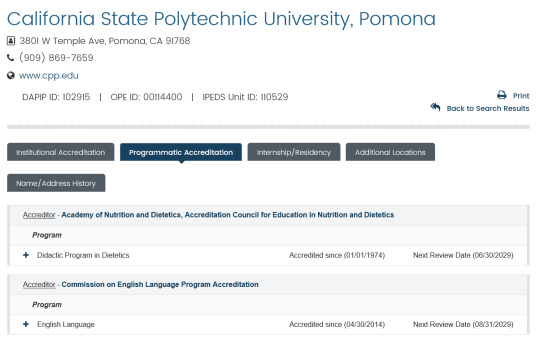
Note that the website for her school is listed with the department of education as wschiro.com because it was called Western States Chiropractic College until 2010.
Every time i dig into something like this it makes me want to stare into space for hours. No wonder college students are getting fucked on their loans and going to bullshit schools. No wonder everything is a scam these days. People bitch about credentialism but you know what maybe this lady is a CNS; sure, for some people that requires passing board certification tests, getting 1000 hours of clinical supervision, and becoming a Nurse Practitioner with real actual nutrition study from a solid program, but for other people it requires zero understanding of statistics, a theater degree, and three *whole* units of anatomy. Maybe she clears the bar on that one! She doesn't have the qualifications for an LDN in New York, she's not an RDN because she sure as fuck didn't take the classes required for a *VERY SERIOUSLY* protected title, but maybe you can be a CNS with an online diploma from the western states chiropractic college.
I fucking hate everything.
You know the whole reason I wanted to get a degree in nutrition was to yell about shit like this online, but fuck it. Fuck it, I'm a nutrition-isht because i live in california and I can say I am and who's going to check? Who's going to look up whether I took classes in public health or anatomy or the metabolism of micronutrients before they hire me to do corporate seminars on healing your relationship to food? I am legally allowed to do that so I might as well, right? If all I have to do is be charismatic and convincing I'm pretty sure I've got that down, actually, so who's going to check?
Nobody! Nobody is going to check and everything is a scam and I hate everything.
ANYWAY
The relationship between nutrition and inflammation and the relationship between chronic disease and inflammation are two different, complicated things that are difficult to point at and say definitively what the connections are.
I am of the opinion that any time you're getting deep into things like an anti-inflammatory, ketogenic, or PH-Balancing diet without a specific condition that calls for the avoidance of certain foods for very clearly scientifically reported reasons, you're dealing with a woo-woo biohacker who's looking to sell a diet plan.
The thing about nutrition science is that it seems like for most people the "answers" are pretty basic: eat enough food, get enough macro and micronutrients, eat a variety of food, avoid processed meats, try to eat more fruits and vegetables, get enough water, and stay as active as possible NOT for weight loss reasons but for metabolic health and joint/muscle maintenance. It's really, really, hard to sell that though, which is how you get people like Abra Pappa in 2013 writing out this bugfuck "Food and mood" handout with a midday snack that is so bonkers in the way the calories are distributed that I'm sitting down and doing math about it (it looks like about a third of the calories that day are supposed to come from the mid afternoon spinach, mint, cocoa nib, and coconut milk smoothie which is, as I said, bugfuck nuts).
It's hard to sell "please eat more fruits and vegetables, which is difficult because actually most places don't grow enough vegetables for the population's nutrition needs and it's cheaper to eat grains and industrially produced meat than it is to eat five cups of vegetables that you need to prepare daily and also maybe skip the bacon" but it's much easier to sell "five anti-inflammatory superfood milkshakes that will fill your belly and fight cancer" because it's packaging nutrition as a product and not as a massive systemic issue that happens to have very specific requirements for a large number of individuals who *do* happen to have disorders that are based on nutrition and inflammation (celiac disease! I've got one of them! Eating the wrong foods definitely causes inflammation in my body as the result of an autoimmune disorder! but that doesn't mean that the things that are inflammatory for me are inflammatory for everyone!)
Anyway I think like about 97% of workplace wellness programs are largely bullshit based, or at least import bullshit a lot of the time, and nutrition is a science that has, just, so much bullshit in and around it.
So I would take anything they say with a grain of salt, and hopefully less than 255% of your RDV of saturated fat (seriously that meal plan is ludicrous).
Side note: there is a subset of nutrition people who looked at the way that we got fat wrong in the 80s and flipped it and reversed it and went "actually you can have as much fat of any kind that you want as long as it is natural and you will have no issues" and this is how you end up with people on 100% natural clean keto diets who have cholesterol levels over 600. Abra Pappa recommends "clean/natural" eating and has taken continuing education on keto and has a recipe for a single-serving smoothie that calls for 8oz of coconut milk I think she's very much in the "'good' fat truther" camp (or at least she was in 2013 which is maybe why New York has a requirement for people to have some kind of nutrition certification for giving out nutrition advice and maybe she should have done that because she didn't even go to her bullshit "grad school" until 2017).
(We DID get fat wrong in the 80s and total avoidance of all fats is bad for you and there are 'good' fats that you should eat and everybody needs to eat some level of fat for proper nutrient absorption but even if you're only getting fat from nuts and avocados that's not going to prevent your arteries from forming plaques if you're having nearly triple the recommended daily value of saturated fat as part of your afternoon snack)
285 notes
·
View notes
Text
What Is Included in the VLCC Nutritionist Course Fees?
Embark on a life-changing adventure and shine as a health and wellness professional with the help of VLCC's renowned Dietitian Courses. These courses will give you the skills and information you need to completely change how people think about their health. This is how we help you realize your full potential through VLCC Dietitian Training. This blog post contains important information such as VLCC Dietitian Course Fees & Courses etc.
Introduction to VLCC Dietitian Courses
The courses offered by VLCC provide a solid foundation in nutrition literacy. Covering both theory and practice, you'll gain a comprehensive understanding of nutritional science. You'll also have the opportunity to make a significant difference in your clients' lives. The duration of your VLCC Nutrition course depends on the course and location you choose.
VLCC Nutrition Course Overview
Check out our wide range of VLCC Nutrition courses, each one designed to meet your career goals and aspirations. Options include a Diploma in Nutrition and Dietetics and an Advanced PG Diploma in Clinical Nutrition.
VLCC Nutrition course fees also vary depending on the course you choose. VLCC Institute provides students with the skills and information they need to succeed in the nutrition field.
Comprehensive Nutrition Courses by VLCC
VLCC Institute offers comprehensive nutrition courses for aspiring professionals covering key topics.
VLCC course fees in Delhi vary depending on the course and location you choose. These courses cover nutrition such as nutrients, the impact of diet on health and its role in preventing diseases. The duration of VLCC nutrition courses also varies depending on the location and the type of course (short-term or long-term).
VLCC Nutrition Course Fees
The cost of nutrition courses include basic certificates as well as advanced diploma programs in Nutrition and Dietetics. VLCC fees for these courses in Delhi typically range between INR 15,000 to INR 150,000 depending on the length and difficulty of the program.
Benefits of Enrolling in VLCC Nutrition Course
VLCC Nutrition course allows you to learn from industry experts. VLCC Nutrition course offers a comprehensive curriculum covering anatomy, physiology, biochemistry, and food science. You can also check out VLCC Nutrition course reviews on multiple social media platforms. Students will learn how to create a nutrition plan tailored to their individual needs towards a holistic approach to health.
Career Opportunities
Completing the nutrition course opens up a variety of career opportunities in clinics, hospitals, gyms, etc. This will also help you cover the cost of the VLCC Nutrition course after earning a good salary in this industry. Hence, you can also check out the VLCC Nutrition Course reviews on other social media platforms.
Top 7 Nutrition Academies of India
Here are some of the best Nutrition Schools in India where you can start your career in the medical field.
1)Meribindiya International Academy
2)Orane Institute
3)NFNA(National Fitness and Nutrition Academy)
4)National Institute of Nutrition Hyderabad
5)University of Delhi
6)Dr. Babasaheb Ambedkar Marathwada University
7)G.B. Pant University of Agriculture and Technology, Pantnagar
Conclusion
VLCC's Dietitian Courses provide a comprehensive education in nutrition, equipping aspiring health professionals with the necessary skills to make a significant impact in the field of health and wellness. By completing these courses, graduates can unlock diverse career opportunities and become trusted authorities in nutrition and dietetics.

2 notes
·
View notes
Text
Diploma Course In Nutrition and Dietetics | NIIB Institute

About Course
This course empowers the candidates with the necessary knowledge to learn about nutrition and dietetics in detail for every age group based on different conditions.
The course contains numerous units to tell you about nutrients and dietary plans, food sources for nutrients and much more for different age groups and different situations.
Course Content:
Anatomy & Physiology- Digestive System
Nutrients-Balanced Diet
Nutrition Care Process
Food & Basic Terminologies in Nutrition
Process of Different Food Selection & Preparation
Food Assimilation and Effect on Growth & Activity
Budget Cooking
Rich Sources of Different Nutrients
Enhance your career in the health and wellness industry with the Diploma Course in Nutrition and Dietetics offered by the NIIB Institute. This comprehensive program provides in-depth knowledge and practical skills to understand human nutrition, dietary planning, and the science behind healthy eating habits. With a curriculum designed to meet current industry standards, students will learn from experienced professionals and gain hands-on experience through internships and practical sessions. Enroll at NIIB Institute today to embark on a rewarding journey towards becoming a qualified nutrition and dietetics expert.
0 notes
Text

#nutrition courses#pg diploma in nutrition and dietetics#clinical nutrition#sports nutrition courses
0 notes
Text

ICRI Online Learning offers a PG Diploma in Nutrition and Dietetics, a comprehensive program focusing on dietary sciences and health management. Participants delve into topics such as nutrition assessment, therapeutic diets, and lifestyle modifications. This diploma equips learners with practical skills to promote health and well-being through evidence-based nutritional practices.
0 notes